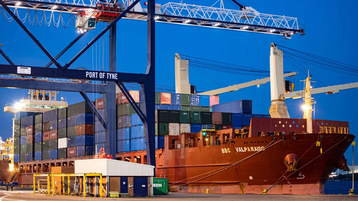The Port of Tyne in the UK has deployed a private network in partnership with BT and Ericsson.
The port, which is one of the UK's biggest, has gone live with 4G and 5G private network connectivity.
Ericsson said that the Port has deployed a private network with coverage across the entire estate.
In doing so, the vendor claims that it's the UK’s first site-wide deployment of 4G and 5G standalone connectivity for smart port applications.
The infrastructure has been built upon an Ericsson Private 5G solution and BT spectrum, whereby both 4G and 5G will operate simultaneously to support legacy devices as well as power new 5G applications in the port’s future transformation.
It will host the first set of live use cases this month, including video and sensors installed at each gate on the site to use automatic number plate recognition (ANPR) to securely manage and track vehicle access, plus 5G-enabled cameras with a 360-degree view at the quayside combined with AI-driven software to provide automated container inspection and identification.
The .private 5G wireless network is expected to support autonomous navigation technology, remote crane operations, connected drones, wearable technology, and a connected ecosystem of AI sensors.
“I believe that 5G is going to play a crucial role in helping Port of Tyne achieve our goals. We can streamline our operations, improve safety and sustainability, and drive growth and innovation throughout the entire maritime industry and beyond," said Matthew Beeton, CEO, Port of Tyne.
"With seamless connectivity, we can link shipping companies, logistics providers, and regulatory bodies from around the world, enabling us to work together more effectively to address global challenges like climate change and cybersecurity threats.”
Telecom companies working with ports to test 5G technology is becoming more common.
Last year, Deutsche Telekom kicked off construction of a 5G field test at the Port of Duisburg, Germany.
The German telco said that semi-automated control of port cranes is to be tested via mobile communications technology, while the project aims to boost the capacity of container handling operations.






